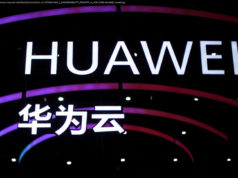A culture of acquiescing to Beijing’s censors is now the norm, and there’s little sign of it changing.
© Wang Zhao / AFP / Getty C hloé Zhao, the director of Nomadland, is new Hollywood royalty. In April, she made history as the first woman of color to win Best Director at the Oscars. In November, her big-budget Marvel movie, Eternals, will arrive in theaters. She commands so much admiration from the industry right now that she gets away with showing up to the red carpet of a film premiere in jeans. Zhao was, for a time, just as warmly regarded in China. Born in Beijing, she also has ties to Chinese entertainment royalty: Her stepmother, Song Dandan, is one of the most celebrated comic actresses in the country. And Zhao’s success in Hollywood made her the model of a crossover artist, bringing Chinese sensibilities to American filmmaking. In March, the Communist Party–owned newspaper Global Times anointed her “the pride of China.” But then an eight-year-old interview in which Zhao called the country a place “where there are lies everywhere” spread online. Beijing responded by deleting social-media celebrations of her Oscar win and canceling the release of Nomadland. Eternals, which should have been a shoo-in to screen across China, now faces a potential ban. Swiftly and quietly, Zhao’s native country appears to have disowned her—at least, for now. (Zhao declined to comment on the matter.) Hers is a cautionary tale—and a common one these days. No matter their clout in Hollywood, filmmakers and actors have always been subject to bosses who decide which movies get to soar at the box office and which are left to languish. Now, more than ever before, that boss is Beijing. In 2020, the Chinese film market officially surpassed North America’s as the world’s biggest box office, all but ensuring that Hollywood studios will continue to do everything possible for access to the country. This also means China will assert itself more aggressively to control Hollywood. The country, which already places a quota on the number of foreign films that can be screened every year, banned them for nearly two months this summer because of celebrations for the 100th anniversary of the Communist Party’s founding. Meanwhile, China’s film industry now churns out its own big-budget franchises, lessening the country’s dependence on the next Fast & Furious installment. Though some American filmmakers, such as Quentin Tarantino and Judd Apatow, have pushed back on China’s demands, they are the rare exceptions willing and able to weather any potential repercussions. Instead, the film industry has regularly shaped its productions to please Beijing; whenever Hollywood fails, it either issues self-flagellatory public apologies or remains silent on the matter altogether. (Universal, Disney, and the other major Hollywood studios I reached out to for this story all declined to comment or did not respond to my requests.) With studios now implementing their own limits on free speech, America’s supposedly gutsy, creative entertainment industry is at rapid risk of making preemptive self-censorship the standard. During the blacklist era of the 1940s and ’50s, Hollywood studios infamously submitted to domestic political pressure. Today, film censorship—the rise of which you can literally watch on screen—has become one of the most visible examples of American businesses bending their values to satisfy China, and a worrying harbinger for any industry that wants access to the country’s consumers. China has simply become too lucrative for Hollywood to resist. © Provided by The Atlantic Gilles Sabrié / The New York Times / Redux W hat critics might call censorship, Hollywood studios might label a market-entry strategy. The phenomenon has long been part of the global film industry. Post–World War II West German audiences saw a different version of Casablanca than the rest of the world. Last Tango in Paris, with its notoriously explicit sex scenes, was edited before it could be released in Britain and barred from being shown in the Canadian province of Nova Scotia.






